Human Growth Hormone (HGH) has become a subject of significant interest within the bodybuilding community due to its potential effects on muscle growth and body composition. As a peptide hormone that stimulates growth, cell reproduction, and cell regeneration, HGH is naturally produced by the pituitary gland. Bodybuilders may seek to increase their levels of HGH through exogenous sources with the intention of enhancing their physique and performance. However, due to the complexities of its use, determining the appropriate dosage is critical.
The right dosage of HGH for bodybuilding purposes is not one-size-fits-all; it varies depending on a multitude of factors, including an individual’s goals, current health status, and tolerance to the hormone. It’s vital for users to understand that while HGH supplementation can offer certain benefits, such as improved muscle mass and a reduction in body fat, it also carries potential health risks and side effects. These may range from minor discomfort to more severe complications. Additionally, HGH often works in conjunction with other hormones, and understanding these synergistic effects can influence how HGH is utilized within bodybuilding.
Quick Summary
- HGH dosage in bodybuilding is personalized and influenced by various individual factors.
- Informed assessment of benefits and risks is crucial for effective and safe HGH use.
- Comprehending hormone synergies and natural optimization plays a role in HGH application.
Understanding HGH
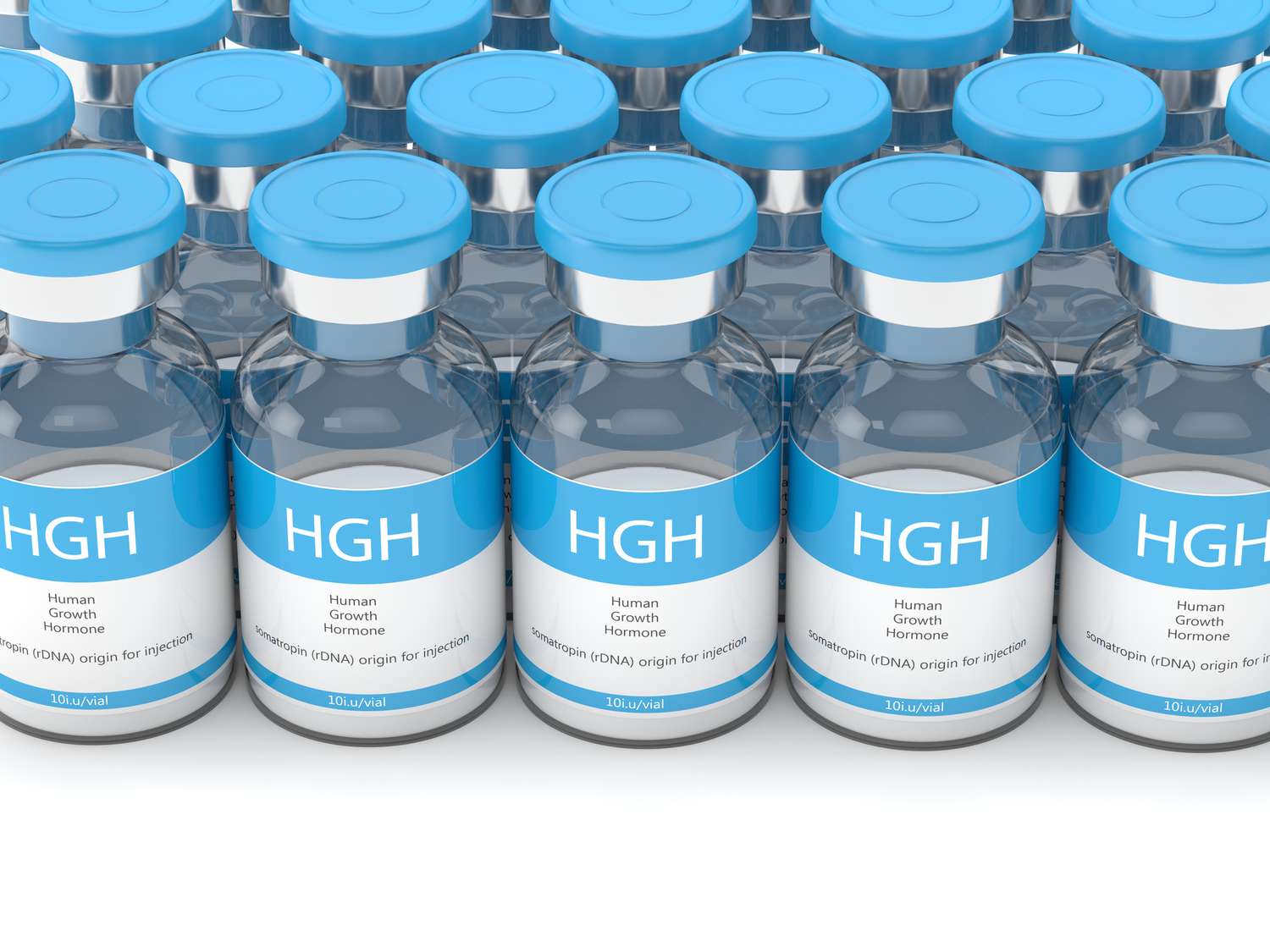
Human Growth Hormone (HGH) is a crucial biochemical substance that plays significant roles in bodybuilding, including muscle growth and recovery. Its availability and efficacy decline with age, thus influencing one’s bodybuilding potential.
The Role of HGH in Bodybuilding
HGH, also known as somatotropin, is vital for muscle development and tissue repair. In bodybuilding, it aids in the synthesis of new protein tissues, promoting muscle recovery and hypertrophy. The substance enhances the body’s ability to burn fat, turning it into energy that can be utilized during intense workouts.
HGH Production and Age
The pituitary gland is responsible for the natural production of growth hormone. The levels of HGH peak during adolescence and substantially decline after the age of 30. This age-related decrease can affect an individual’s muscle mass and overall physical development, sometimes leading to a condition known as growth hormone deficiency.
Determining the Right Dosage

When considering the use of human growth hormone (HGH) for bodybuilding, determining the correct dosage is critical for safety and efficacy. Dosage recommendations vary based on a range of factors, and should be carefully tailored to individual needs.
Factors Influencing Dosage
- Age: Younger individuals may require less HGH, as they generally produce more naturally.
- Gender: Men typically need higher dosages than women due to differences in body composition.
- Body Composition: Those with higher body fat percentages may require different dosages compared to individuals with leaner muscle mass.
- Goal: Desired outcomes, whether it be muscle mass increase or improved athletic performance, can impact the amount of HGH used.
- Experience: Seasoned bodybuilders might adjust their doses based on past experiences with HGH.
Typical Dosage for Bodybuilders
- Men: Commonly, male bodybuilders start at 2 to 4 IU per day, which can be increased based on body response and goals.
- Women: Generally start at lower doses, around 1 to 2 IU daily, due to their body’s sensitivity to the hormone.
It’s imperative that those choosing to use HGH for bodybuilding consult with a healthcare provider to monitor results and potential side effects. Dosages should be adjusted only under medical supervision.
References
Benefits of HGH Supplementation
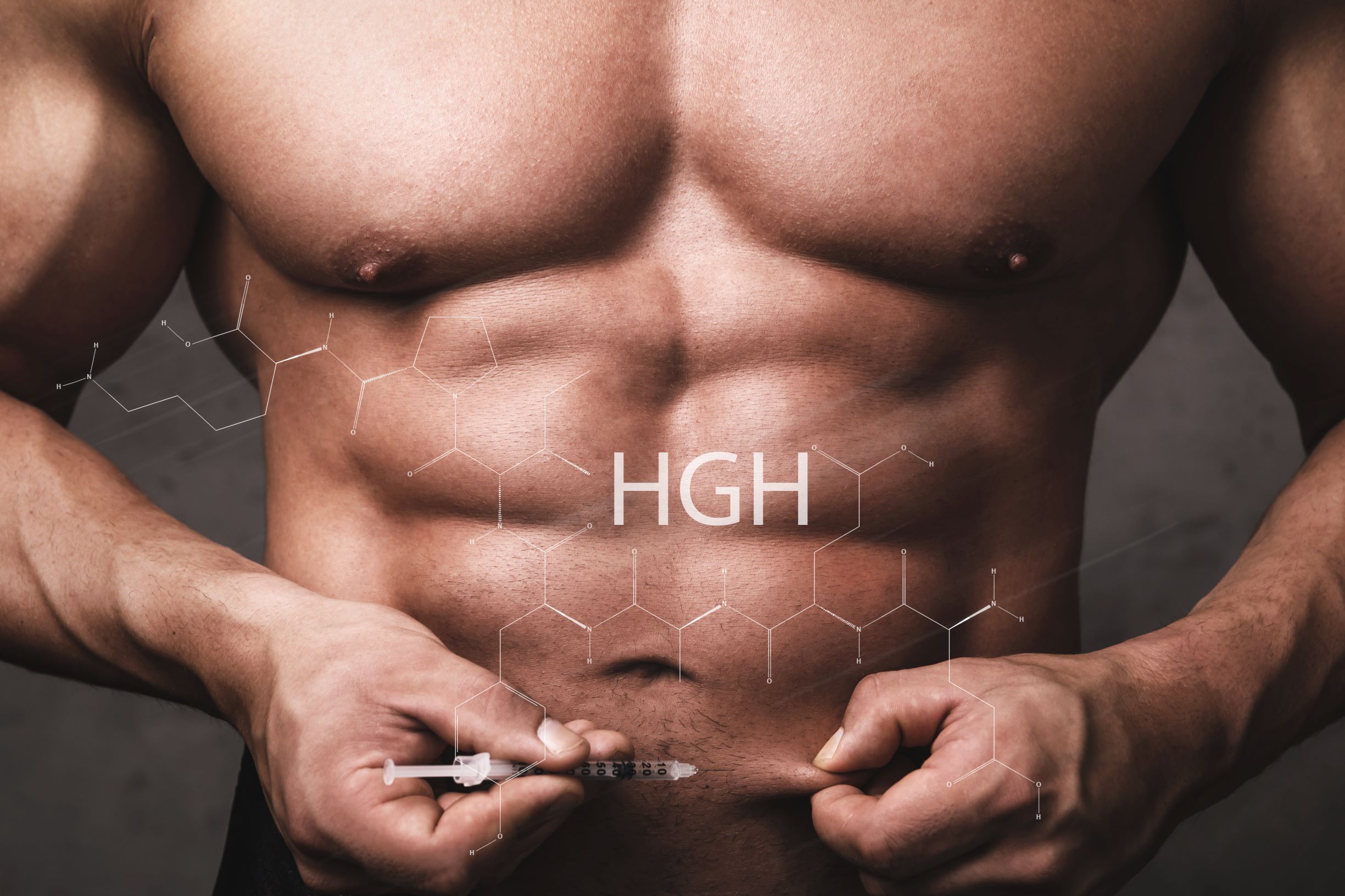
Human Growth Hormone (HGH) plays a pivotal role in muscle growth and metabolic function, making it a substance of interest for bodybuilders. Supplementation with HGH is claimed to enhance one’s physique by improving muscle size and promoting fat loss, while also influencing energy levels.
Muscle Growth and Development
Bodybuilders often seek to increase their lean muscle mass. HGH supplementation can stimulate the production of collagen in skeletal muscle and tendons, potentially leading to improved muscle strength and performance. The hormone’s ability to promote muscle growth is linked to its role in cell repair and regeneration, which is crucial for muscle-building activities.
Fat Loss and Metabolism
In addition to muscle-building benefits, HGH can assist with fat loss by accelerating lipolysis, the breakdown of lipids. Its effect on metabolism allows for more effective utilization of fat stores for energy, potentially leading to a leaner body composition. The elevation in energy levels from enhanced metabolism is another factor that can benefit bodybuilders during both training sessions and recovery periods.
Health Risks and Side Effects
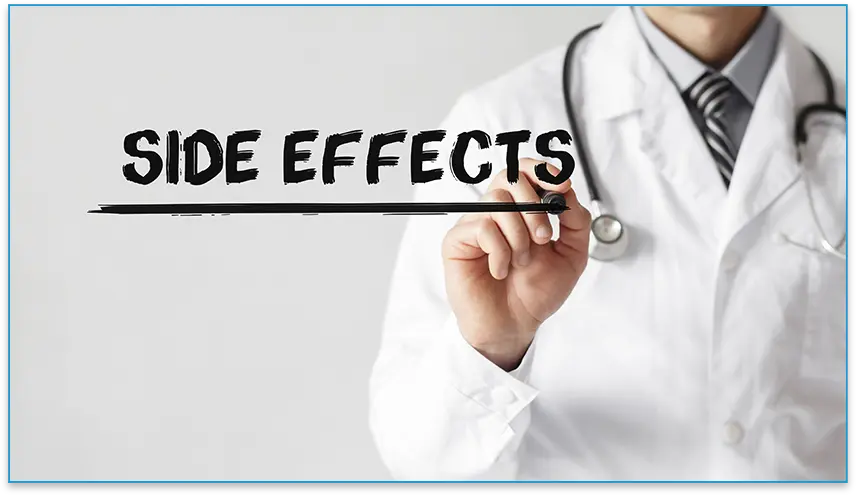
Human Growth Hormone (HGH) usage in bodybuilding can lead to a range of side effects and long-term health implications. This section examines the most common side effects experienced by individuals in the short term, as well as potential long-term health consequences of HGH supplementation.
Common Side Effects
When bodybuilders use HGH, side effects can vary in severity. Notable ones include:
- Water Retention: Manifesting as swelling in the body’s extremities and leading to a bloated appearance.
- Joint Pain: Individuals may experience pain due to the abnormal growth or stress on the joints.
- Carpal Tunnel Syndrome: Characterized by tingling and pain in the hand and fingers, arising from nerve pressure.
A table summarizing common side effects:
| Side Effect | Description |
|---|---|
| Water Retention | Swelling and puffiness, especially in the limbs. |
| Joint Pain | Discomfort or pain in joints, potentially causing limits on mobility. |
| Carpal Tunnel Syndrome | Tingling, numbness, and pain in the hand and arm. |
Long-Term Health Implications
Continuous or excessive use of HGH can lead to more severe health issues, several of which include:
- Acromegaly: Overgrowth of bones in the face, hands, and feet. This is often irreversible.
- Cell Growth: Including the potential to stimulate the growth of cancerous cells.
- Insulin Resistance: This can lead to diabetes and significantly impact one’s health.
Specific health implications listings:
- Acromegaly: Deformities and altered facial appearance due to the enlargement of skull, jaw, hands, and feet.
- Cancer Risk: Increases due to accelerated cell growth, particularly concerning if there’s a pre-existing malignancy.
- Insulin Resistance: Heightened risk of developing diabetes and associated complications.
References
Injection Protocols and Cycles
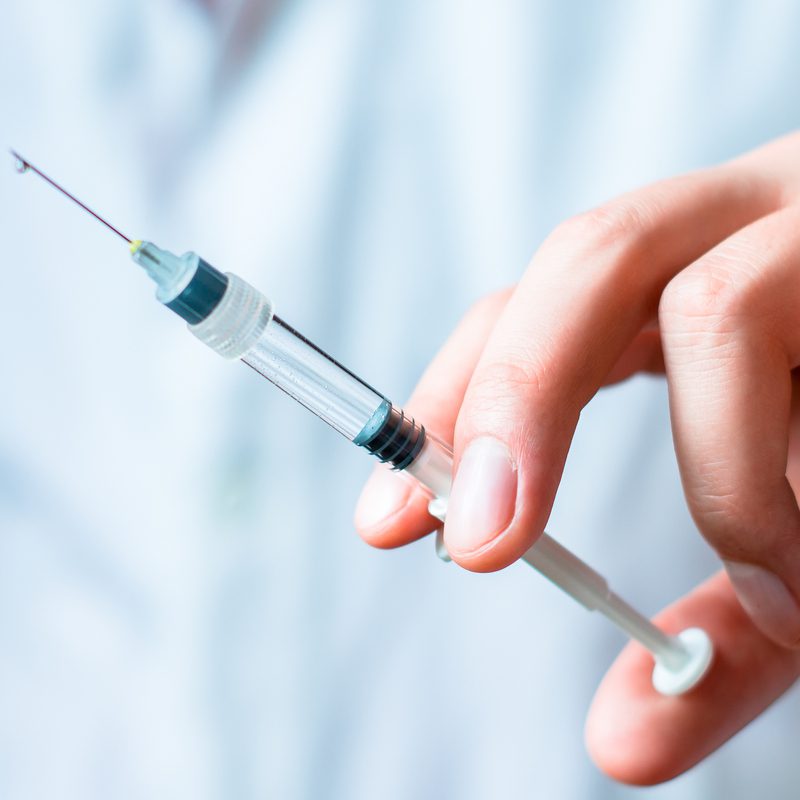
When it comes to human growth hormone (HGH) in bodybuilding, the injection protocols and cycles are pivotal for optimizing results while minimizing risks. These elements define how HGH is administered and the strategic timing and duration of its usage.
Injection Techniques
HGH is typically injected subcutaneously or intramuscularly. The subcutaneous method involves injecting into the fat layer beneath the skin, often in the abdomen region. This technique leads to a slower release of the hormone. Intramuscular injections, however, are directed into the muscle and may lead to a quicker uptake into the bloodstream.
For those administering HGH, using a sterile technique is crucial to prevent infection. It is recommended to rotate injection sites to avoid lipodystrophy. The use of insulin needles is common due to their fine gauge, which makes the injection less painful and reduces the risk of injecting into muscle tissue when intending a subcutaneous injection.
Structuring an HGH Cycle
Structuring an HGH cycle involves planning the dosage, duration, timing, and any other substances that will be used concurrently, such as anabolic androgenic steroids (AAS), insulin, or T3.
- Dosage: A typical HGH cycle for bodybuilding might range from 2 to 6 IU daily, depending on the individual’s experience and goals.
- Duration: Cycles can vary in length, but a common duration is between 12 to 16 weeks, with some long-term users taking HGH for extended periods up to 6 months or more.
- Timing: The timing of injections can be important, and many users opt for a split dose, administered twice daily. One dose may be taken in the morning and another post workout or before bed.
- Concurrent Usage: If insulin or T3 are used, careful timing is required to minimize risks. AAS are often included in a cycle to synergize the muscle-building effects, but this combination should be monitored closely due to the increased risk of side effects.
Synergistic Effects with Other Hormones

When integrating human growth hormone (HGH) into a bodybuilding regimen, understanding the synergistic effects it may have with other hormones is critical for maximizing results while minimizing risks.
Combining HGH with Steroids
Human growth hormone and anabolic steroids are often used together to amplify muscle growth and improve recovery times. Testosterone, a potent anabolic steroid, works synergistically with HGH, enhancing its effects on muscle protein synthesis. When combined, these hormones can lead to significant increases in lean body mass. Careful management of dosage is critical as the combination can increase the risk of side effects.
- Anabolic Steroids Effectiveness:
- Increased protein synthesis
- Enhanced muscle recovery
- Risks of Combination:
- Potential hormonal imbalances
- Increased side effect profile
Interactions with Insulin and Thyroid Hormones
Insulin and thyroid hormones, specifically T3, play a pivotal role when administered alongside HGH. Insulin, commonly used for its anabolic properties in muscle building, can act in concert with HGH to promote tissue growth, particularly by affecting IGF-1 levels. Thyroid hormones, on the other hand, can modulate the body’s overall metabolism, influencing the effectiveness of HGH. Adjusting the dosages of HGH, insulin, and T3 is necessary to maintain hormonal equilibrium and optimize the muscle-building effects.
- Insulin Synergy:
- Increased IGF-1 production
- Augmented anabolic effect on muscle tissue
- Thyroid Hormones Interaction:
- Regulated metabolic rate
- Enhanced HGH efficacy through metabolic modulation
References
Optimizing HGH Levels Naturally

Balancing human growth hormone (HGH) levels can greatly impact muscle mass and protein synthesis.
Dietary and Lifestyle Factors
Sleep: Adequate sleep is crucial for maintaining healthy HGH levels. It is during deep sleep that HGH is predominantly released. Ensuring 7 to 9 hours of sleep per night can enhance natural HGH secretion.
Exercise: Regular exercise, especially high-intensity interval training (HIIT), stimulates HGH production. Resistance training is particularly effective since it directly supports muscle growth and HGH release.
Diet: A balanced diet that includes sufficient protein can foster amino acid uptake crucial for protein synthesis and HGH. Reducing sugar intake is also beneficial as insulin spikes can inhibit HGH production.
Natural Supplements that Support HGH
Arginine: As an amino acid, arginine may boost HGH levels when taken in doses of 120 to 500 milligrams per day before bed or before exercise.
Glycine: Studies have shown that glycine can stimulate HGH secretion. Incorporating glycine supplements into the diet may promote protein synthesis and muscle growth.
References
- Sleep and Endocrinology NCBI
- The Effects of High-Intensity Intermittent Exercise Training on Fat Loss and Fasting Insulin Levels of Young Women NCBI
- Protein-Which is Best? NCBI
- Acute and chronic effects of arginine intake on the growth hormone secretory pattern in healthy adults ResearchGate
- The in vivo effect of glycine on insulin secretory response and glucose metabolism SpringerLink
Monitoring and Adjusting Treatment
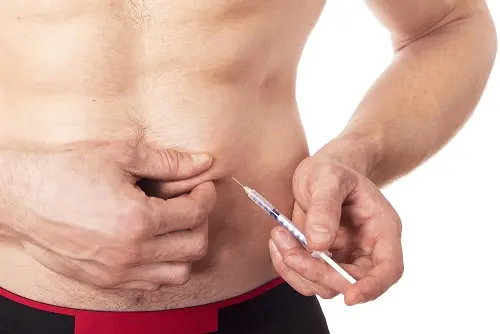
When using HGH for bodybuilding, it is crucial to monitor physiological markers and adjust dosages appropriately to optimize the benefits while minimizing potential risks.
Evaluating Effects on Body Composition
Human Growth Hormone (HGH) therapy can significantly alter body composition by increasing lean body mass and reducing fat. Regular assessment of these changes is essential using methods like DXA scans or bioelectrical impedance analysis. A consistent change in body composition without adverse effects indicates a potentially successful HGH regimen.
- Increase in Lean Body Mass: Investigations should be cataloged periodically, looking for increases in muscle tissue which can be quantified and monitored over time.
- Reduction in Fat Mass: Reduction in adipose tissue is another desired outcome. Comparative analyses on fat loss should be done to confirm the efficacy of the treatment.
Blood glucose levels should be examined routinely, since HGH can influence insulin sensitivity, sometimes leading to increased glucose levels.
Adjustments Based on Results
The results from the health monitoring and body composition assessment guide the adjustment of HGH dosage. The goal is to achieve an optimal balance between maximizing muscle gains and reducing fat, while also maintaining normal blood pressure and mitigating fatigue or other side effects.
- Positive Results Without Side Effects: If monitoring indicates positive results and the absence of negative side effects, the current HGH dosage may be continued.
- Presence of Adverse Effects: If issues such as elevated blood glucose or blood pressure, excessive fatigue or other health concerns arise, a reduction in dosage or a reevaluation of the treatment protocol may be necessary.
Frequently Asked Questions

Understanding the impact of Human Growth Hormone (HGH) on bodybuilding can aid athletes in adjusting their dosages for optimal results. The specified dosages and cycles reflect common practices among the community and can vary based on individual goals and experiences.
What are the expected results from taking 4 IU of HGH per day for bodybuilding purposes?
At 4 IU per day, bodybuilders may experience improved muscle growth, enhanced fat loss, and a quicker recovery after intense workouts. This dosage aims to simulate the body’s natural growth hormone levels for heightened athletic performance.
How does a 2 IU per day HGH regimen impact bodybuilding outcomes?
A more conservative approach, 2 IU per day, often leads to modest gains in lean muscle mass and reductions in body fat over a more extended period. It is generally considered a maintenance dose for long-term body composition improvement.
What is an ideal beginner’s HGH cycle for bodybuilding?
An ideal beginner’s HGH cycle for bodybuilding typically starts with lower doses, such as 1-2 IU per day, gradually increasing to acclimate the body. Initial cycles might last from 12 to 16 weeks, allowing the athlete to gauge the body’s response.
What differences are typically observed in bodybuilders before and after starting an HGH cycle?
Bodybuilders often notice increased lean body mass, reduced fat stores, better sleep quality, and improved skin texture. Subjective improvements in energy levels and exercise capacity have also been reported after commencing HGH regimens.
What are the recommended HGH dosages for bodybuilders using Pfizer Genotropin?
Pfizer Genotropin dosages for bodybuilding vary, with some athletes administering 2-4 IU per day based on their experience and goals. Medical guidance is essential to establish a personalized and safe dosing regimen.
How is an HGH cycle structured for bodybuilding goals?
HGH cycles for bodybuilding purposes are tailored based on individual response and goals, with dosages often split into multiple injections throughout the day. Cycles can last several months to maximize muscle growth while minimizing potential side effects.
References
- Saugy, M., Robinson, N., Saudan, C., Baume, N., Avois, L., & Mangin, P. (2006). Human Growth Hormone Doping in Sport. British Journal of Sports Medicine, 40(Suppl 1), i35-i39. [https://bjsm.bmj.com/content/40/suppl_1/i35.full]
- Velloso, C. P. (2008). Regulation of muscle mass by growth hormone and IGF-I. British Journal of Pharmacology, 154(3), 557-568. [https://bpspubs.onlinelibrary.wiley.com/doi/full/10.1038/bjp.2008.153]
- Giannoulis, M. G., Martin, F. C., Nair, K. S., Umpleby, A. M., & Sonksen, P. (2012). Hormone Replacement Therapy and Physical Function in Healthy Older Men. Time to Talk Hormones? Endocrine Reviews, 33(3), 314–377. [https://academic.oup.com/edrv/article/33/3/314/2354715]
- Holt, R. I., & Sönksen, P. H. (2008). Growth Hormone, IGF-I and Insulin and their Abuse in Sport. British Journal of Pharmacology, 154(3), 542-556. [https://bpspubs.onlinelibrary.wiley.com/doi/full/10.1038/bjp.2008.99]
Dr. Grant Fourie, a specialist in male hormones, is based in Cape Town, South Africa. He provides comprehensive treatments for conditions related to low testosterone, such as erectile dysfunction, fatigue, and mood changes. His methods include hormone replacement therapy and other modern treatment options.
Contact me via email or phone to book personal appointment in my clinic: The Village Square, Cape Town - South Africa



